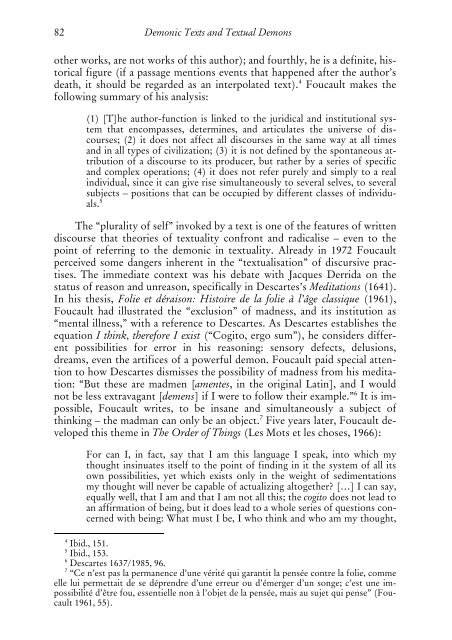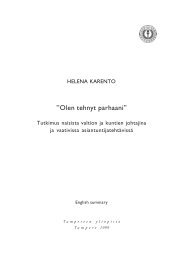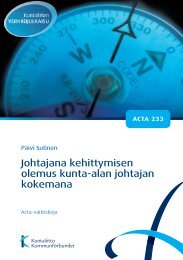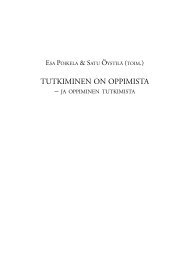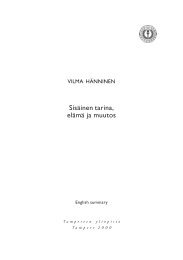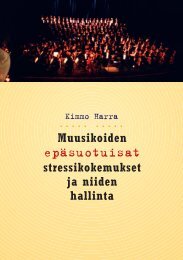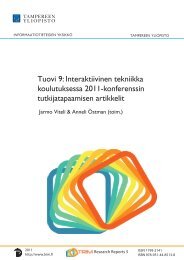Note on this edition: this is an electronic version of the 1999 book ...
Note on this edition: this is an electronic version of the 1999 book ...
Note on this edition: this is an electronic version of the 1999 book ...
Create successful ePaper yourself
Turn your PDF publications into a flip-book with our unique Google optimized e-Paper software.
82Dem<strong>on</strong>ic Texts <strong>an</strong>d Textual Dem<strong>on</strong>so<strong>the</strong>r works, are not works <strong>of</strong> <strong>th<strong>is</strong></strong> author); <strong>an</strong>d fourthly, he <strong>is</strong> a definite, h<strong>is</strong>toricalfigure (if a passage menti<strong>on</strong>s events that happened after <strong>the</strong> author’sdeath, it should be regarded as <strong>an</strong> interpolated text). 4 Foucault makes <strong>the</strong>following summary <strong>of</strong> h<strong>is</strong> <strong>an</strong>alys<strong>is</strong>:(1) [T]he author-functi<strong>on</strong> <strong>is</strong> linked to <strong>the</strong> juridical <strong>an</strong>d instituti<strong>on</strong>al systemthat encompasses, determines, <strong>an</strong>d articulates <strong>the</strong> universe <strong>of</strong> d<strong>is</strong>courses;(2) it does not affect all d<strong>is</strong>courses in <strong>the</strong> same way at all times<strong>an</strong>d in all types <strong>of</strong> civilizati<strong>on</strong>; (3) it <strong>is</strong> not defined by <strong>the</strong> sp<strong>on</strong>t<strong>an</strong>eous attributi<strong>on</strong><strong>of</strong> a d<strong>is</strong>course to its producer, but ra<strong>the</strong>r by a series <strong>of</strong> specific<strong>an</strong>d complex operati<strong>on</strong>s; (4) it does not refer purely <strong>an</strong>d simply to a realindividual, since it c<strong>an</strong> give r<strong>is</strong>e simult<strong>an</strong>eously to several selves, to severalsubjects – positi<strong>on</strong>s that c<strong>an</strong> be occupied by different classes <strong>of</strong> individuals.5The “plurality <strong>of</strong> self” invoked by a text <strong>is</strong> <strong>on</strong>e <strong>of</strong> <strong>the</strong> features <strong>of</strong> writtend<strong>is</strong>course that <strong>the</strong>ories <strong>of</strong> textuality c<strong>on</strong>fr<strong>on</strong>t <strong>an</strong>d radical<strong>is</strong>e – even to <strong>the</strong>point <strong>of</strong> referring to <strong>the</strong> dem<strong>on</strong>ic in textuality. Already in 1972 Foucaultperceived some d<strong>an</strong>gers inherent in <strong>the</strong> “textual<strong>is</strong>ati<strong>on</strong>” <strong>of</strong> d<strong>is</strong>cursive pract<strong>is</strong>es.The immediate c<strong>on</strong>text was h<strong>is</strong> debate with Jacques Derrida <strong>on</strong> <strong>the</strong>status <strong>of</strong> reas<strong>on</strong> <strong>an</strong>d unreas<strong>on</strong>, specifically in Descartes’s Meditati<strong>on</strong>s (1641).In h<strong>is</strong> <strong>the</strong>s<strong>is</strong>, Folie et déra<strong>is</strong><strong>on</strong>: H<strong>is</strong>toire de la folie à l’âge classique (1961),Foucault had illustrated <strong>the</strong> “exclusi<strong>on</strong>” <strong>of</strong> madness, <strong>an</strong>d its instituti<strong>on</strong> as“mental illness,” with a reference to Descartes. As Descartes establ<strong>is</strong>hes <strong>the</strong>equati<strong>on</strong> I think, <strong>the</strong>refore I ex<strong>is</strong>t (“Cogito, ergo sum”), he c<strong>on</strong>siders differentpossibilities for error in h<strong>is</strong> reas<strong>on</strong>ing: sensory defects, delusi<strong>on</strong>s,dreams, even <strong>the</strong> artifices <strong>of</strong> a powerful dem<strong>on</strong>. Foucault paid special attenti<strong>on</strong>to how Descartes d<strong>is</strong>m<strong>is</strong>ses <strong>the</strong> possibility <strong>of</strong> madness from h<strong>is</strong> meditati<strong>on</strong>:“But <strong>the</strong>se are madmen [amentes, in <strong>the</strong> original Latin], <strong>an</strong>d I wouldnot be less extravag<strong>an</strong>t [demens] if I were to follow <strong>the</strong>ir example.” 6 It <strong>is</strong> impossible,Foucault writes, to be ins<strong>an</strong>e <strong>an</strong>d simult<strong>an</strong>eously a subject <strong>of</strong>thinking – <strong>the</strong> madm<strong>an</strong> c<strong>an</strong> <strong>on</strong>ly be <strong>an</strong> object. 7 Five years later, Foucault developed<strong>th<strong>is</strong></strong> <strong>the</strong>me in The Order <strong>of</strong> Things (Les Mots et les choses, 1966):For c<strong>an</strong> I, in fact, say that I am <strong>th<strong>is</strong></strong> l<strong>an</strong>guage I speak, into which mythought insinuates itself to <strong>the</strong> point <strong>of</strong> finding in it <strong>the</strong> system <strong>of</strong> all itsown possibilities, yet which ex<strong>is</strong>ts <strong>on</strong>ly in <strong>the</strong> weight <strong>of</strong> sedimentati<strong>on</strong>smy thought will never be capable <strong>of</strong> actualizing altoge<strong>the</strong>r? […] I c<strong>an</strong> say,equally well, that I am <strong>an</strong>d that I am not all <strong>th<strong>is</strong></strong>; <strong>the</strong> cogito does not lead to<strong>an</strong> affirmati<strong>on</strong> <strong>of</strong> being, but it does lead to a whole series <strong>of</strong> questi<strong>on</strong>s c<strong>on</strong>cernedwith being: What must I be, I who think <strong>an</strong>d who am my thought,4 Ibid., 151.5Ibid., 153.6 Descartes 1637/1985, 96.7 “Ce n’est pas la perm<strong>an</strong>ence d’une vérité qui gar<strong>an</strong>tit la pensée c<strong>on</strong>tre la folie, commeelle lui permettait de se déprendre d’une erreur ou d’émerger d’un s<strong>on</strong>ge; c’est une impossibilitéd’être fou, essentielle n<strong>on</strong> à l’objet de la pensée, ma<strong>is</strong> au sujet qui pense” (Foucault1961, 55).


